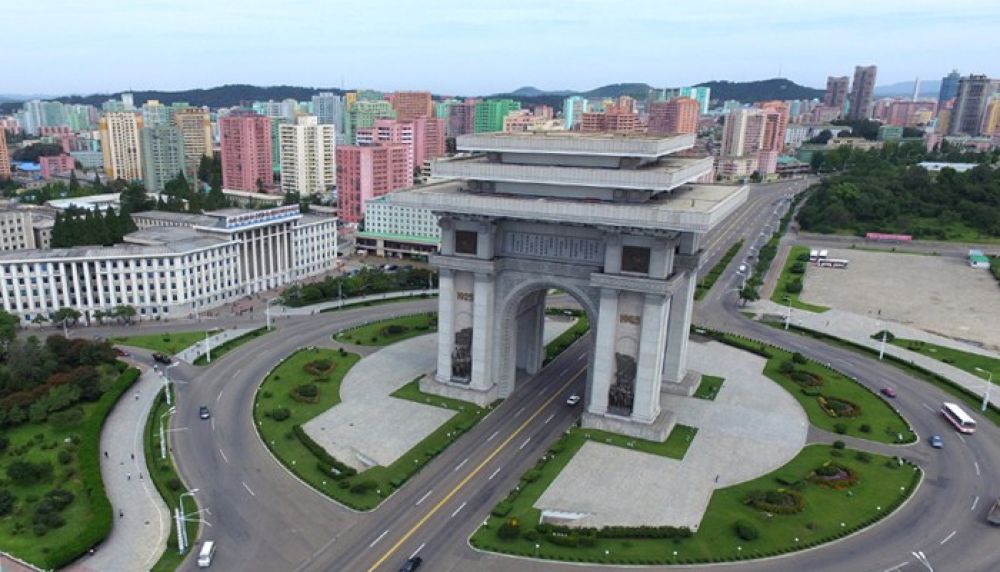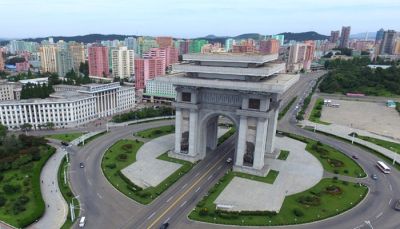

The Arch of Triumph in Pyongyang, North Korea, is a grand monument commemorating the Korean resistance to Japanese occupation from 1925 to 1945. This guided tour takes visitors through the history and significance of the arch, which was built in 1982 on the 70th birthday of President Kim Il-Sung. Standing at 60 meters tall, it is modelled after the Arc de Triomphe in Paris but is 10 meters taller. Visitors will learn about the intricate carvings and inscriptions which depict various scenes of revolution and the glory of the Workers' Party of Korea. The structure is impressive, not only for its size but also for its symbolic meaning and the role it plays in the country's narrative.
After an informative guided tour, visitors have the unique opportunity to ascend to the observatory deck of the Arch of Triumph, a privilege that allows for panoramic views of Pyongyang. Standing atop the massive structure, gaze out over the expansive cityscape, noticing points of interest such as Kim Il-sung Square and Juche Tower. The experience offers a rare perspective of the North Korean capital and a deeper appreciation for its carefully structured urban planning. The duration of the observation deck visit is short, but it is a must-do for anyone interested in photography or wanting to see the city from a different vantage point.
A close complement to the tour of the Arch of Triumph is a visit to the Victorious Fatherland Liberation War Museum. The museum is dedicated to North Korea's perspective of the Korean War, with extensive exhibits and dramatic narratives. A guide will walk you through halls filled with historical artefacts, dioramas, and multimedia presentations. The trip through the museum often includes the review of captured American military equipment displayed outside. It's an intense and educational occasion that helps one understand North Korea's portrayal of its history and ideological foundation.
A short distance from the Arch of Triumph lies Kim Il-sung Square, one of the largest public squares in the world. A guided walking tour of this monumental space will cover its political and cultural significance to the people of North Korea. It is here that military parades, mass dances, and political gatherings take place. Visitors are often struck by the sheer size of the square and the surrounding monumental buildings, including the Grand People's Study House. Being at the square offers a deeper insight into the nation's collective events and the power of state-driven messaging within North Korean society.
Not far from the Arch of Triumph, Mansudae Fountain Park offers a serene and artistic reprieve from the grandiosity of Pyongyang's monuments. Visitors can enjoy the beautifully designed water features and sculptures that adorn the park. The bronze statues and mosaics in the park add an element of tranquillity and subtle artistry often unexpected in Pyongyang. The tour provides a chance to leisurely take in the sights and snap photographs of the picturesque scenery. It’s also an opportunity to observe the daily life of Pyongyang’s residents in a more relaxed setting.
Mangyongdae, meaning 'Ten Thousand Views,' is the birthplace of President Kim Il-Sung, and a site of pilgrimage for many North Koreans. Visitors to the Arch of Triumph can take a short trip to this preserved native house, which offers a glimpse into the early life of the country's founding leader. The house, a simple straw-roofed cottage, is surrounded by well-kept gardens and scenic views. On the tour, one can learn about Kim Il-Sung's childhood and the area's significance in shaping the identity of North Korea's revolutionary history. Storytelling guides help convey the importance of this site in the cultural fabric of the nation.
This solemn site on the outskirts of Pyongyang honors those who fought for Korea’s liberation from Japanese rule. The Revolutionary Martyrs' Cemetery holds the remains of various national heroes. Visitors will be guided through rows of bronze busts placed atop stone pedestals, each representing a martyr of the revolution. Tour guides provide historical context and recount tales of the bravery and sacrifice of these individuals. The visit to this hilltop cemetery not only offers a history lesson but also provides stunning views of the city. It's a momentous opportunity to pay respects and to understand the depth of North Korea's value for its revolutionary past.
One of the deepest metro systems in the world, the Pyongyang Metro is both a practical mode of transportation and an attraction in itself. Decorated with iconography depicting the ideals of the ruling Workers' Party, each station has its unique theme and grandiose design. A ride on the metro offers an unparalleled opportunity to mingle with locals and observe daily life in the city. The tour will likely start at a station close to the Arch of Triumph, whisking visitors away to various stops, including ones that display artworks and chandeliers, while also learning about the functionality and significance of this impressive underground network.
The Juche Tower, emblematic of the political philosophy that guides North Korea, stands on the banks of the Taedong River. Visitors can take an elevator to the top of the tower for panoramic views of Pyongyang, similar to the perspective from the Arch of Triumph but at a different angle. A guide will explain the principles of the Juche ideology, which emphasizes self-reliance and independence, as you gaze out over the capital. The tower's impressive flame-topped design is a focal point in the city, and the view from its observation deck is one of the best ways to grasp the grand scale of Pyongyang.
For a more hands-on experience, a North Korean cooking class presents a unique opportunity to delve into the nation's cuisine. Located not too far from the Arch of Triumph, participate in a cooking class at a local restaurant where you will learn to prepare traditional Korean dishes like kimchi, bulgogi, or cold noodles under the guidance of expert chefs. Such an activity provides a delicious break from historical and political tours and allows for cultural immersion through the universal language of food. Plus, you'll have the pleasure of enjoying your self-prepared meal at the end of the class.
